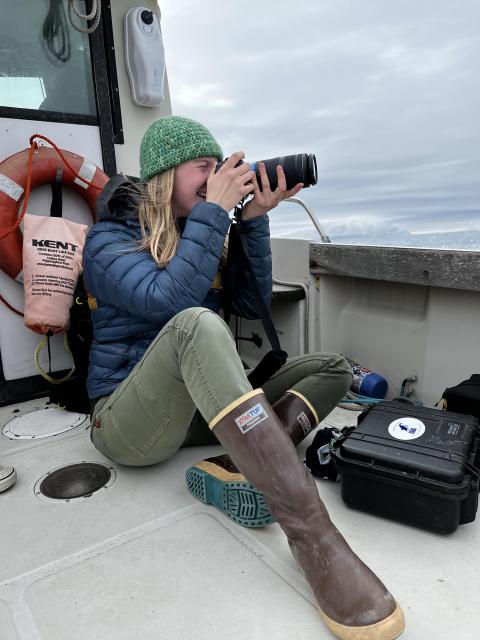
Wildlife and conservation biology major Carly Hoag ’23 is interning at an estuarine research reserve in Alaska this summer. The Dover, New Hampshire native has taken time out of her busy schedule to answer a few of our questions.
Carly was able to accept the unpaid internship thanks to a stipend from COLSA’s SOAR Fund. The fund supports undergraduate students by providing stipends that may be used to supplement unpaid internships or pay for transportation to interviews and career events. The SOAR Fund accepts applications year-round. While all COLSA students are invited to apply, applicants with financial need are strongly encouraged.
Carly Hoag: I am an intern with the North Gulf Oceanic Society and the Kachemak Bay National Estuarine Research Reserve in Homer, Alaska. I go onboard vessels and spot and identify marine mammals and seabirds and take photos and videos of harbor porpoises. From these surveys, we gather data on harbor porpoise mating and foraging activity and identify individuals to get a better idea of their social structures and how individual animals act and where they go within the area. I sort through these photos on my computer, organizing and analyzing them.
We also sample eDNA and water quality in two harbor porpoise mating hotspots in Kachemak Bay and will begin photo- and video-documenting the harbor porpoises using drones, and in the water using snorkeling equipment and Go Pros. I will update our photo identification catalog and searchable database of this species as we continue gathering data this season.
Carly: I don't have the opportunity to study marine life in my major at UNH but they are incredibly important to consider in terms of conservation biology. I love this area of the world and the creatures that reside here. I wouldn't be able to study these animals in the way that I am in any other place, and I'm so grateful for the mentors I have here!
Carly: I was able to capture harbor porpoise mating on video! Only recently have researchers been able to determine how they mate, and there is still much to learn. I am also very proud to be a part of creating further protections for this species. In this area of Alaska, jet skis were recently permitted where they hadn't been before, and we are trying to see how this has affected sensitive and vulnerable marine mammals. Our findings will affect future policy.
Carly: Scientific research has the power to impact policy that can protect the species in question. And I can be part of that research!
Carly: I have become proficient in the type of fieldwork that takes place on boats and in the use of DSLR
cameras with zoom lenses. I have never done field work like this, and I would love to continue working outside with animals like this after I graduate.
Learn more
Carly: Reach out to the people doing research you're interested in. Even if they don't currently have an official internship program, they can make one for you based on your interests and what would be useful in their research.
Carly: I have met some of my closest friends at UNH. I feel grateful that our campus has such a unique natural area (College Woods) that has been the focus of many of my studies.